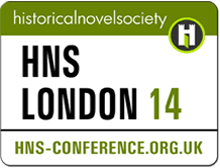This weekend I was fortunate to spend in London at the Historical Novel Society Conference. This is the second such event I have attended and I enjoyed it more than the first (although that was fun too). This was primarily because 2 years ago I was there as a bit of a hanger on with the Indie/ self publishing table and knew almost nobody. This year I found I knew quite a lot of folk. Indeed Friday evening when I arrived the first thing that happened was that a number of Facebook friends said hello and it was good to meet folk that until now I have only just talked with online. I was also much less nervous at being amongst all these other authors because you soon release that they are actually human too!
One of the factors that made me feel more conformable was that the event was launched on Friday evening with the First HNS Indie Award. This event was thought up by the wonderful Helen Hollick who is a great champion of Indie and Self Published authors and novels. The award was presented by Elizabeth Chadwick. The idea was to recognize superb Indie fiction. I was delighted to see that one of the short listed novels was by a author who has attended my UK Games Expo on the writers table: Dave Mccall – writing as Dave Ebsworth and his book Jacobite’s Apprentice. So right away it was clear that the HNS have a pretty open approach to us self published authors. I knew this to an extent already – being a HNS Indie reviewer but organizing an award was a nice reinforcement. As i chatted to folk during the Friday evening drinks session I came accross a mix of mainstream authors, fellow Indie authors and readers – all interested in historical fiction of course.
The main conference took place on Saturday all day and Sunday morning. There was a conference dinner one could attend on either Friday or Saturday night at a nearby restaurant which was noisy but fun. the food was inspired by 18th century dishes. I had London Paticular pea soup and Kedgeree.
The main event however were the addresses and workshops. I will look at a few here.
Selling Historical Fiction: the challenges and triumphs was an opportunity to hear what publishers felt worked in selling fiction. Some principles – a good cover for example clearly apply equally to INdie as to mainstream. Other comments about adverts in newspapers less so. The panel was mostly publishers and book buyers for WH smith – those kind of folk. So I found that it assumed we were talking about what sells mainstream books already destined for the windows of waterstones. It would have been good to have had an indie perspective from a successful indie author as to what works for them with the harder struggle of getting recognition for them selves.
Conn Iggulden’s address as guest of hour was excellent. Witty and clever, I found it useful on more than one level. I do talks at school and adult groups and found he has a natural ability to be entertaining and that I found myself paying attention to as much how he spoke as what he said. But as for what he said one message was the need for Historical Fiction Authors to make certain choices when faced with the unknowns of history. In the end we are writing fiction. It is NOT a thesis and it is meant to entertain. Academics shy away from making pronouncements when they don’t know what really happened. Fiction writers cannot not. You just have to make a choice you can defend. This was encouraging given the scarcity of known facts I have to deal with in the 7th century.
I attended a workshop on Mavericks in fiction which was a useful look at the attraction of characters who stray a bit away from the norm. I also discovered a new author – Angus Donald whose Outlaw Series I will be checking out. His fellow panelist JAMES AITCHESON wrote about a Norman Knight after the conquest. It also sounded worth a look.
I think my favourite session of the whole conference was the “My Era is better than yours” where 5 authors defended Ancient Rome, Vikings, The Age of Chivalry, Tudors and Georgian England. Some well thought out arguments and funny banter made this a great session.
On Sunday the best session from my point of view was the Workshop on Battle Scenes. This was a well presented analysis of the elements that make for a good battle scene: the importance of research, the technology of the weapons, the terrain, the tactics used and the chance for the hero to be at the critical location.
We finished with a fun quiz on historical fiction. I cant believe I forgot which Sharpe novel Isiah tongue dies in!!
there were many other workshop on such things as self publishing, the use of historical language etc,
All in all a great weekend if you are a historical fiction writer, or trying to become one. You can meet other authors, editors etc and make some useful contacts. Roll on the next one.





Related Articles
No user responded in this post